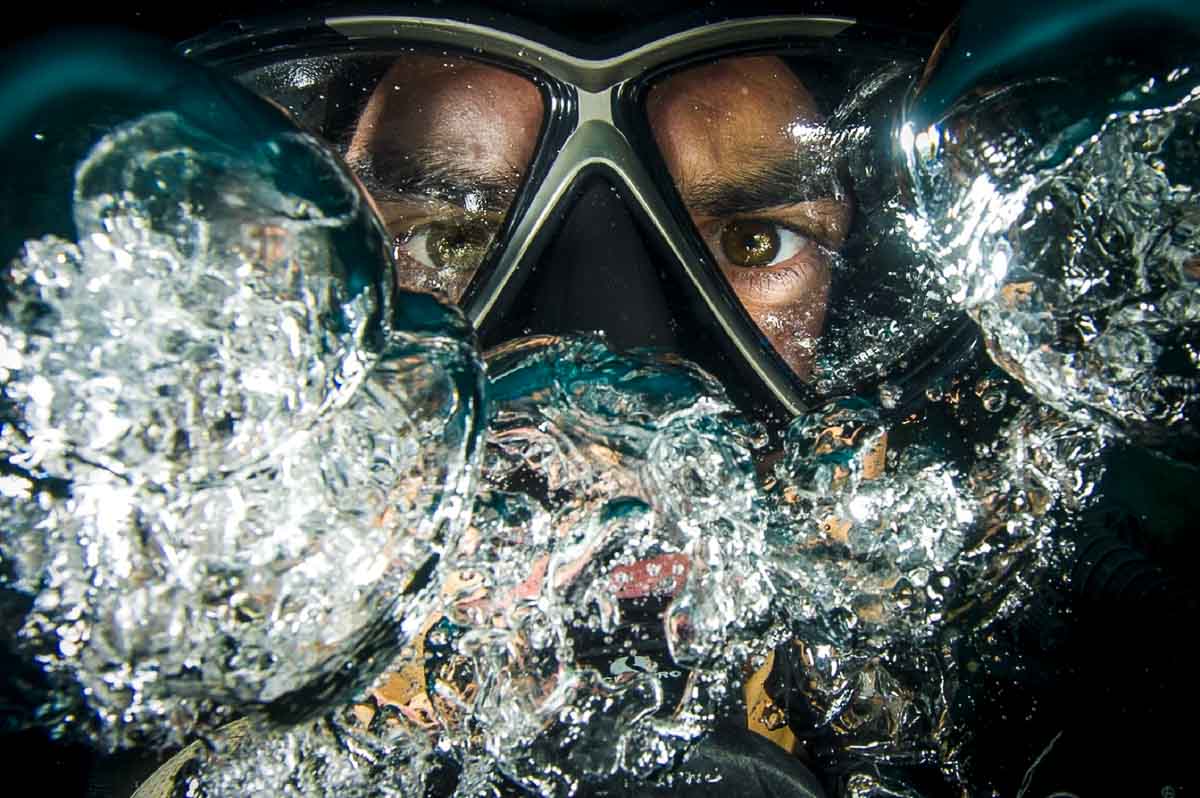Nitrogen narcosis is a condition that can occur when divers breathe nitrogen-rich air at high pressure. It is also sometimes called “rapture of the deep” or “the Martini effect” because it can cause feelings of euphoria and drunkenness.
At depth, the nitrogen in your air becomes compressed and diffuses into your bloodstream. This can lead to symptoms such as dizziness, impaired judgment, and confused thinking. In severe cases, it can cause unconsciousness and even death.
Nitrogen narcosis is a serious hazard for divers, and it is important to be aware of the symptoms and how to avoid it. Keep reading to learn more about nitrogen narcosis – including its symptoms, causes, and treatment.
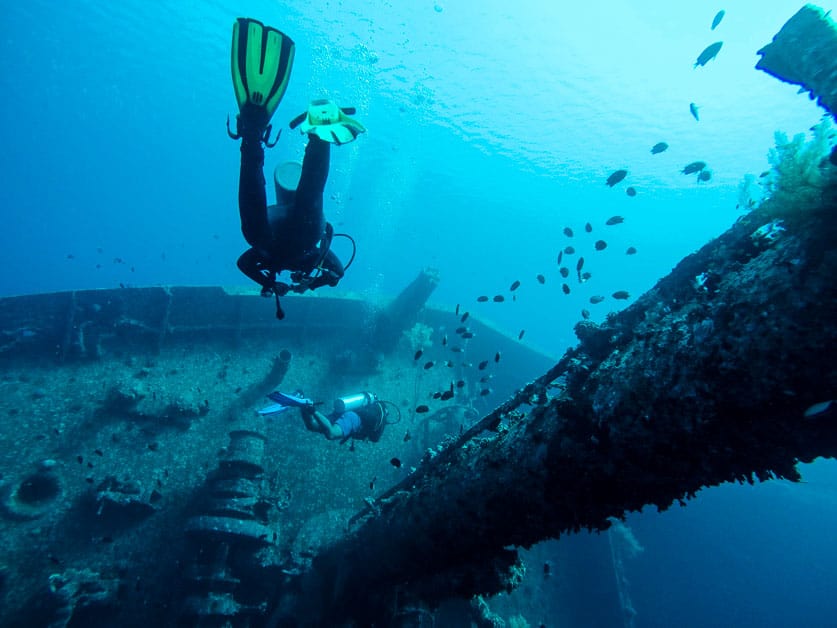
NITROGEN NARCOSIS SCUBA DIVING
- Nitrogen Narcosis Definition: What is Narcosis?
- Why is Nitrogen Narcosis a Problem?
- What Causes Nitrogen Narcosis?
- At What Depth are you Likely to Encounter Nitrogen Narcosis?
- Danger and Susceptibility
- Nitrogen Narcosis Symptoms
- Nitrogen Narcosis Treatment
- Nitrogen Narcosis Prevention
- Nitrogen Narcosis vs. The Bends
- Nitrogen Narcosis and Nitrox
- Recreational vs. Tech Divers
Nitrogen Narcosis Definition: What is Narcosis?
The bane of many a scuba diver’s adventures; Nitrogen narcosis is the term used to describe the potentially devastating effect that nitrogen has on a diver. The effect is said to be narcotic due to the mental impairment it causes.
Jacques Cousteau described the condition as raptures of the deep. As understanding has progressed, it has become apparent that other gases can have a narcotic effect too and you might hear reference to inert gas narcosis or diving narcosis. More commonly you will hear divers refer to getting narced or being narced.
Essentially these terms all describe the same thing; a narcotic effect like the effect alcohol has on us. Some scuba divers even refer to the martini law to describe the sensation; one martini per 30ft, so at 90ft the effect of narcosis is like that of 3 martinis.
Why is Nitrogen Narcosis a Problem?
In a normal recreational dive, our scuba tanks are filled with air. It’s the same air we breathe on land and made up of 21% oxygen and 79% nitrogen. We need oxygen to survive; we breathe it in, and our bodies use it. We have no use for the nitrogen. The waste product of this process is carbon dioxide, which, along with the nitrogen and unused oxygen is exhaled.
The same process happens underwater with the key difference being that the water pressure causes nitrogen to be dissolved in our tissues instead of being harmlessly expelled. The deeper we dive, the greater the pressure, the more nitrogen is dissolved in our tissues.
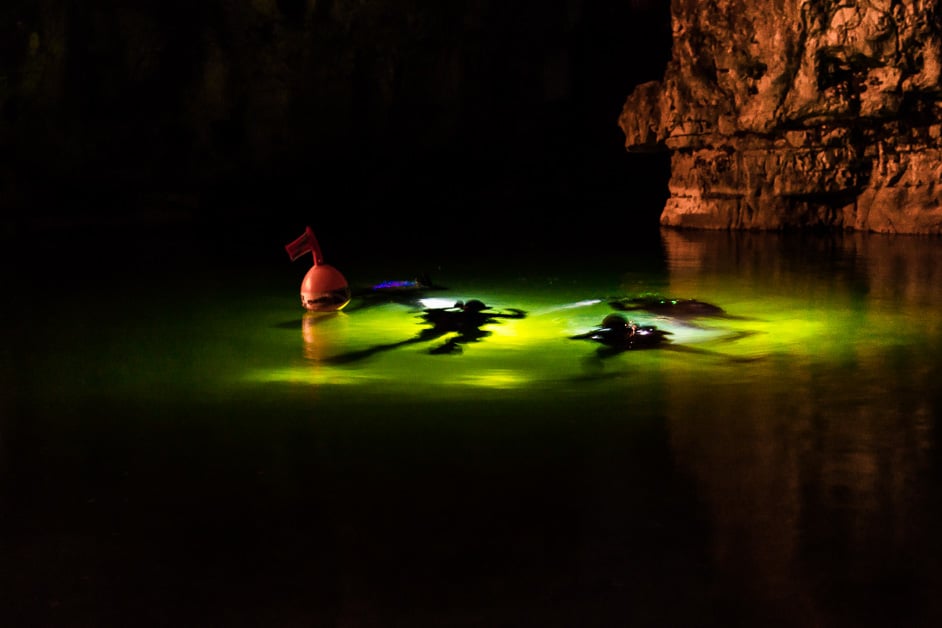
What Causes Nitrogen Narcosis?
Surprisingly the chief cause of nitrogen narcosis is still rather vague. On a simple level, the dissolved nitrogen impairs the body’s internal ability to send messages. The deeper we go, the more gas is absorbed, and the harder it is for our body to send messages.
Our brains, spinal column, and nervous systems send trillions of signals each second. These signals are unconscious; you don’t instruct your mouth to chew; the instructions are sent instantly.
If you think of these messages zipping along like cars on a highway. Now imagine those cars at rush hour; the congestion slows the cars in much the same way that dissolved nitrogen interferes with the body’s ability to send messages.
At What Depth are you Likely to Encounter Nitrogen Narcosis?
Nitrogen absorption starts from the moment we leave the surface and the pressure increases. On average narcotic effects don’t become apparent until 100ft, but that isn’t to say that you should be indifferent towards narcosis at shallower depths. Prudent scuba divers are vigilant from 60ft.
You should also understand that your reaction can differ by dive and by day. Just because you thought you felt fine at 100ft on one dive, it doesn’t mean you will always feel that way.
Beyond 100ft, your likelihood of experiencing narcosis increases significantly and the deeper you go the greater the effect. It’s one of the reasons that diver training agencies limit advanced recreational certifications to this depth.
Danger and Susceptibility
Susceptibility
Anecdotally it seems that some divers are more susceptible than others, but there is no science to back this up, only diver experience. However, our minds are powerful things, and you could posit that those scuba divers who believe they are more susceptible, are merely so, because they think they are. Placebo narcosis if you would. Pre-dive anxiety could also be a contributing factor to the diver’s underwater experience; divers that think they’re going to get narced are likely to be anxious about it.
If that is true, by extension those divers that think they don’t get narced are less likely to feel that they are. The pending unknown is whether this confidence is misplaced or falsely derived from a symptom of the narcosis itself. The impairment even stands to cause one to forget how the narcosis made them act and feel underwater in the first place.
Can You Reduce Your Risk of Nitrogen Narcosis?
Yes, you can stay shallow. Otherwise, make sure you are physically fit to dive. Make sure you are well rested and not under the effects of alcohol and drugs; including any residual effects from the night before. If you are taking prescription medicine, speak to your doctor before diving.
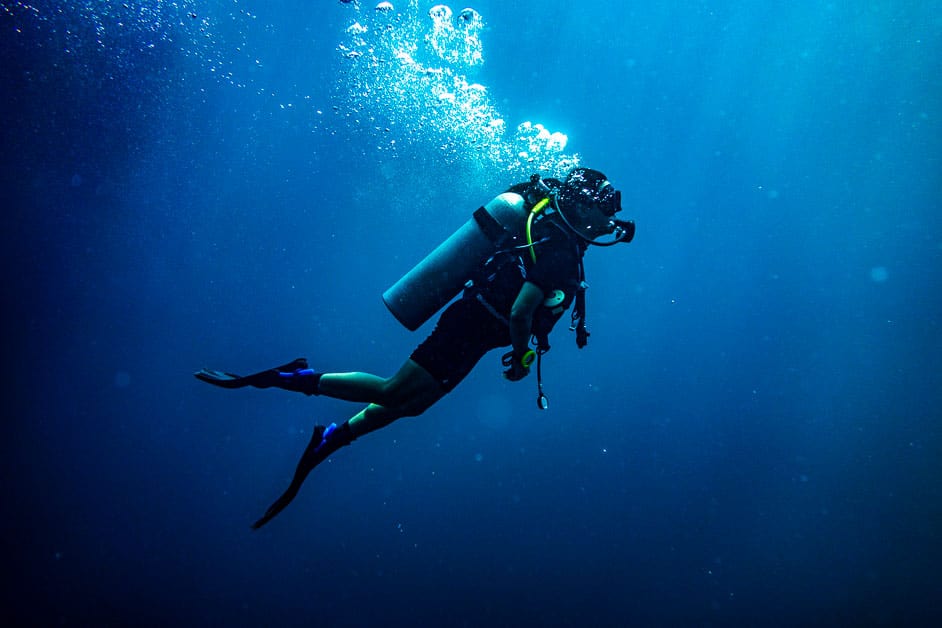
Recreational Diver Training and Narcosis
Recreationally deep diving is classed as diving deeper than 60ft. Most entry-level courses limit your qualification to 60ft. If you want to dive deeper than 60ft, further training is required.
An advanced certification usually qualifies you to dive to 100ft. Most training agencies have a supplemental course that will qualify you to dive up to the maximum recreational depth of 130ft.
Courses that qualify you to 100-130ft will include a demonstration of narcosis; a diver may be asked to write their name backward or solve a simple puzzle. The instructor may time the diver both on the surface and at depth.
It’s quite common for the diver not to recognize that they were impaired even after taking notably longer to complete a simple task. They’re often astounded at the difference in speed. The struggle, whether they noticed it or not, to complete these tasks and the extended time it took is often quite significant and serves as an effective reminder of the risks of narcosis.
Is Nitrogen Narcosis Dangerous?
In and of itself, nitrogen narcosis is not harmful, you don’t suffer narcosis poisoning, and it doesn’t have any long-term or residual effect. The problem with nitrogen narcosis results from the symptoms it causes and where you are when it takes effect; underwater.
Nitrogen Narcosis Symptoms
The symptoms of nitrogen narcosis are similar to being drunk or under the influence of a narcotic.
Mental Slowness / Confusion / Decreased Co-ordination
Narcosis makes complex thought difficult, and your thinking will be cloudy.
As it’s hard to think about multiple things at once, your reaction time and problem-solving ability can be impaired. This effect makes multi-tasking hard and means that your capacity to react to any number of circumstances could be reduced. Couple this with decreased coordination and a lack of dexterity, and your ability to act could also be reduced.
Dealing with a broken mask strap at 30ft is the same as dealing with one at 100ft, but at 100ft it may take you extra time to decide what to do, remember which pocket you stored your spare, and get your fingers to work the fastenings. Apply this to an out of air situation, and you can see the danger with a delayed reaction or confusion when locating an air source.
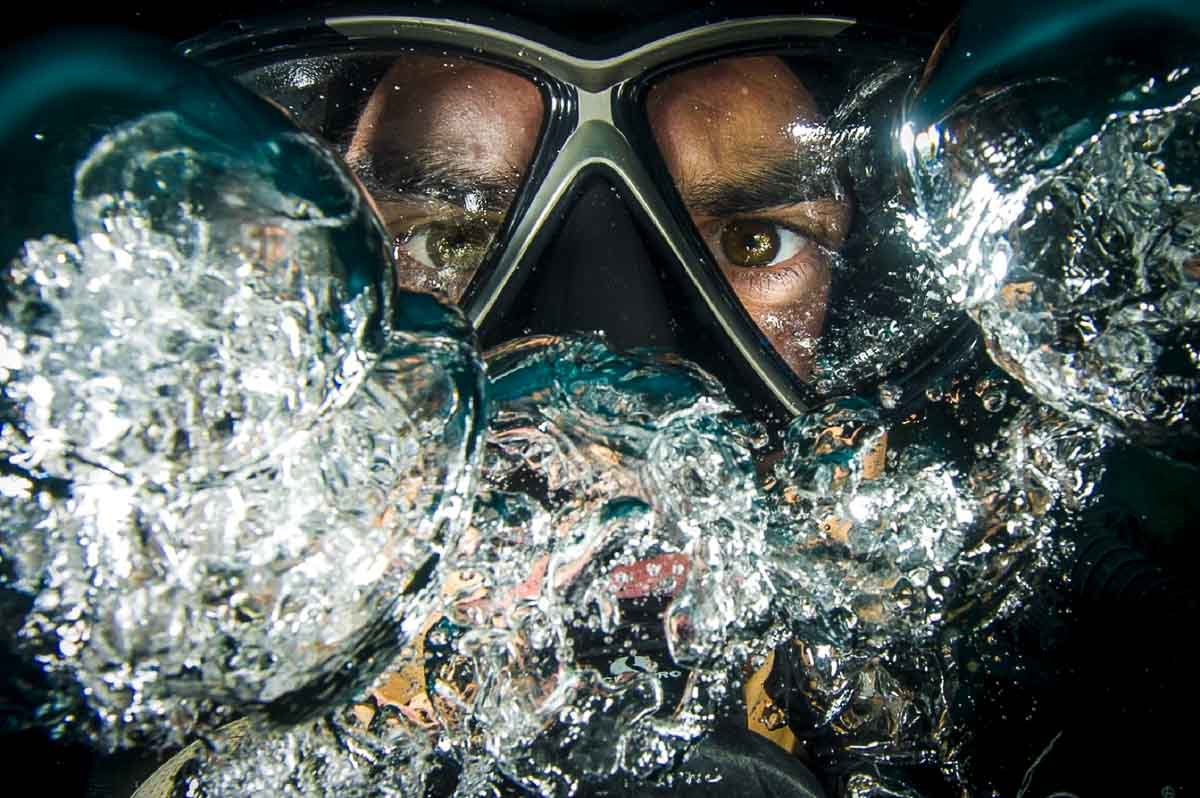
Difficulty Concentrating
From the outset of your dive training, you are taught to follow a plan and monitor your depth, time, and gas pressure. These factors are key to your safety, and you learn early because there are plenty of wonderful sights to distract you.
At depth, narcosis compounds distraction; pretty fish are captivating, and your inattention to monitoring your gauges could lead to you going too deep, staying too long, or running low on gas.
Altered Perception / Hallucinations
Everyone has heard a tall tale about a diver talking to or trying to share air with fish. There are many variations, and they’re often extreme and told as funny stories, and while no one ever seems to know the diver involved directly, there is some basis in fact.
What I can vouch for is the diver who mistook a military helmet for a turtle and the diver that was convinced that a rope was hot to the touch.
These stories are entertaining post dive currency. But, what of the diver who goes deeper, oblivious to all danger, for a closer look at whatever enticing thing their nitrogen addled brain has conjured up?
Memory loss
Narcosis can make you forget how to do things like how to switch modes on your camera or, where the downline is, or more worryingly, what the display on your dive computer is telling you. It can also make you forget portions of your dive; after a deep dive, it’s interesting to see how your memory of the dive differs to that of your buddy.
Fixation / Perceptual Narrowing
Idea fixation can overwhelm to the detriment of all other factors. A diver could become obsessed with a malfunctioning torch. Turning it on and off repeatedly, shaking it, banging it; the problem is that they have not noticed their depth, where their buddy is, or even where they are.
Elation / Euphoria / False confidence / Impaired Judgement
You may find things extremely funny, a fit of the giggles is a clear sign of narcosis. Unlike other signs, laughter is obvious to your buddy, which is a good thing, unless they too are consumed with giggles at the same thing.
Many people enjoy the warm, fuzzy, happy feeling they have after a few drinks. This sensation is fine if you’re sat safely in your garden, enjoying the sun. Underwater false contentment could lead you to disregard limits.
Similarly, a couple of drinks might artificially boost your confidence, but narcosis underwater could lead you to push the boundaries beyond what is safe. Think about it, skewed judgment after a few drinks might lead you to believe you can dance; underwater, you might believe you’ll be fine inside a wreck. Your dancing might leave you shamefaced the next day but entering a wreck narced will be far worse.
Paranoia / Anxiety / Panic / Sadness
Emotions go both ways, and it may be that poor visibility contributes to more negative feelings. Divers have genuinely thought their buddy was out to get them or felt too sad to ascend. I can personally attest to a wreck dive where I was convinced someone was sneaking around behind me but hiding every time I looked for them. You can see how these feelings can result in buddy separation or much worse.
Dizziness / Nausea
In much the same way that too much alcohol will make you feel dizzy or sick; too much nitrogen can have a similar effect.
Inertia
Narcosis can cause passivity, which would leave you apathetic to any safety parameters and unable to act.
Numbness
Much like alcohol narcosis can cause a numbing effect, and you might not notice the cold or an injury.
Unconsciousness and Death
To get to the state of unconsciousness, you had to ignore some big red flags and continued to descend. Narcosis has been described ‘as the sate of impending general anesthesia’ by the authors of Diving and Subaquatic Medicine. Continuing to descend makes the impending happen. Unfortunately, unless you happen to be wearing a full-face mask, unconsciousness underwater is nearly always fatal.

Nitrogen Narcosis Treatment
Narcosis is difficult to predict; it can strike the same person at different depths on different days, but 100ft is the depth around which scuba divers should be aware of narcosis. The problem is your ability to determine that you’re affected while under its influence is problematic.
Ascend and Reassess
Should you feel any ill effects or notice them in your buddy, the solution is simple. Ascend a little until the feelings subside. Once you’re clear-headed and feel free of the effects, decide what you want to do. Unless you want to, there is no need to end the dive, there are no residual effects, and you can safely enjoy the rest of your dive at a shallower depth.
Don’t Go Back Down
Unlike alcohol, the effects of narcosis can come on quite quickly, but symptoms will only get worse if you descend. Once you’ve ascended, stay at that depth or shallower.
Nitrogen Narcosis Prevention
Use The Buddy System
When scuba diving nitrogen affects every diver, so discuss it with your buddy. Find out their experience and share yours. Discuss hand signals and have a system. Maybe you agree to ‘check-in’ with each other every 5 minutes by signaling your gas pressure. Checks keep you alert to the time, conscious of the plan, and aware of gas consumption. In this scenario, it would be easy to see if your buddy falters or seems confused.
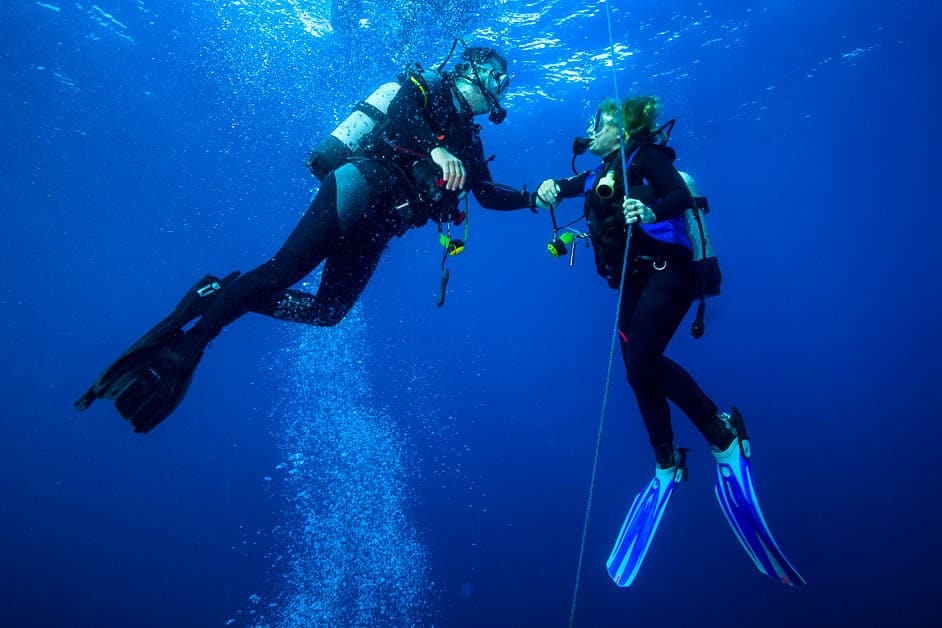
Simplify Everything
If you’re diving deep, keep the plan simple, even simple tasks like tieing a knot can prove complicated and don’t under-estimate how much longer a task might take. Don’t try and achieve too much. Write key things down on a slate, so you don’t have to remember them.
Practice
The more you practice skills and techniques, the faster you will react. Newer and less familiar skills and techniques are the harder ones to remember and employ when narced.
Stay Familiar
Where possible, don’t dive deep with an unfamiliar buddy. Don’t take a new piece of equipment to depth until you are familiar with it in shallow water.
Don’t Overexert
Breathing hard underwater is inadvisable for several reasons, but it can contribute to narcosis too. Consider your dive plan and the potential for current.
Know Your Limits
Don’t dive beyond the depth to which you are trained. Even if you are trained, you do not have to go deep. Don’t go deep just for the sake of going deep. It’s your choice, don’t succumb to peer pressure as your level of discomfort or anxiety will only be exacerbated. Divers of a younger age should always partner with a trained dive instructor and stay well within their limits at all times underwater.
Be Prudent
Always err on the side of caution and never be afraid to call a dive. It’s your choice; no one should blame you for it. If they do, find someone else to dive with.
Nitrogen Narcosis vs. The Bends
The bends or decompression sickness is the other problem caused by nitrogen. Decompression sickness occurs when pressure is reduced too quickly, and the dissolved nitrogen in the diver’s tissues comes out as bubbles. The bubbles cause blockages; their locations and quantity dictate the severity and type of injury. Treatment includes oxygen and hyperbaric therapy to encourage safe elimination of the nitrogen.
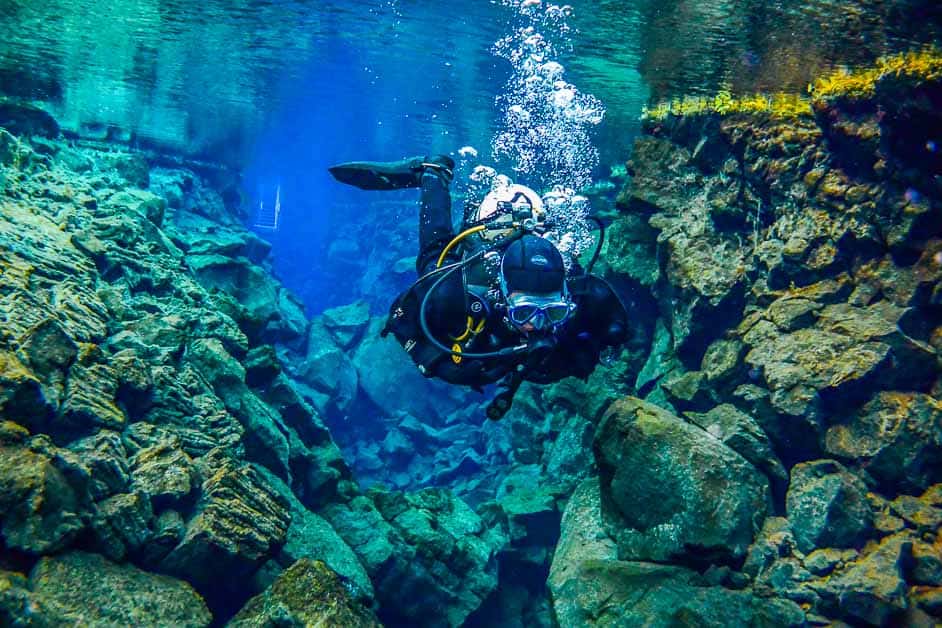
Can you Train, Build up a Tolerance, or Adapt to Nitrogen Narcosis?
Unlike alcohol, narcosis isn’t something that you build up a tolerance to. Through experience, you can learn to cope with its effects, but it’s more like becoming accustomed to the deficit it causes. Practicing skills so that they are second nature helps.
Nitrogen Narcosis and Nitrox
Air is comprised of 78% nitrogen, 21% oxygen, and 1% other gasses. Nitrox – otherwise known as enriched air – is a gas mixture with the same components as air, but with a higher concentration of oxygen than in natural air. More oxygen means less nitrogen, so you would be forgiven for thinking that would mean you would be less likely to suffer from nitrogen narcosis. Not so, although you are unlikely to hear anyone refer to oxygen narcosis, oxygen is narcotic too, so it makes no difference.
Don’t forget that oxygen also becomes toxic at depth, so with a 32% oxygen mix you’re limited to 112ft, and with a 36% mix, you are limited to 95ft. Limiting your depth does limit the potential and severity of narcosis.
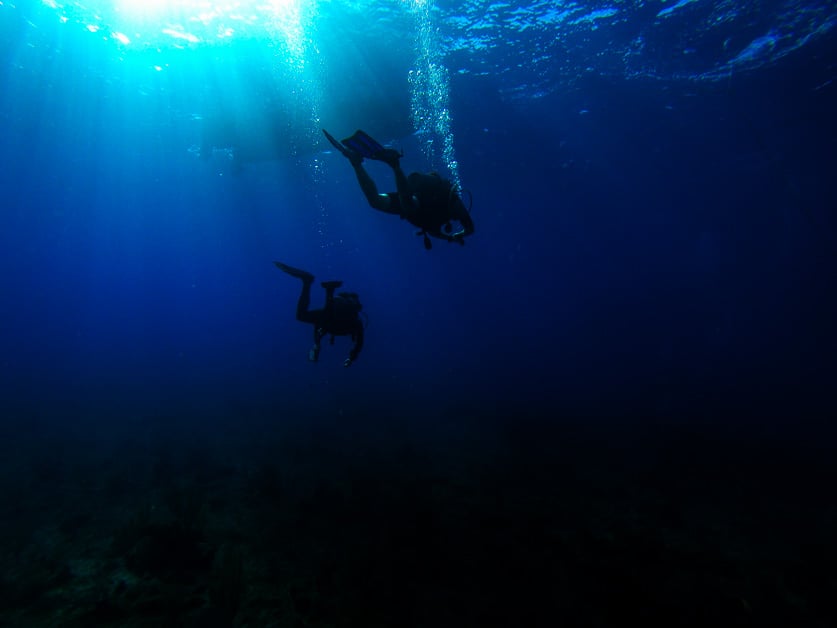
Recreational vs. Tech Divers
Technical divers reach depths beyond 130ft. To counteract the effects of narcosis, divers replace some of the nitrogen with helium, thereby taking less nitrogen diving.
The amount they replace depends upon the depth they want to simulate being at. What this means is that a diver who, in terms of narcosis, wants to simulate being at 100ft would add more helium than a diver who was comfortable with an equivalent air depth of 120ft.
Tech divers also drill and practice so that their skills and techniques are ingrained. They are prudent, and they keep dive objectives simple.
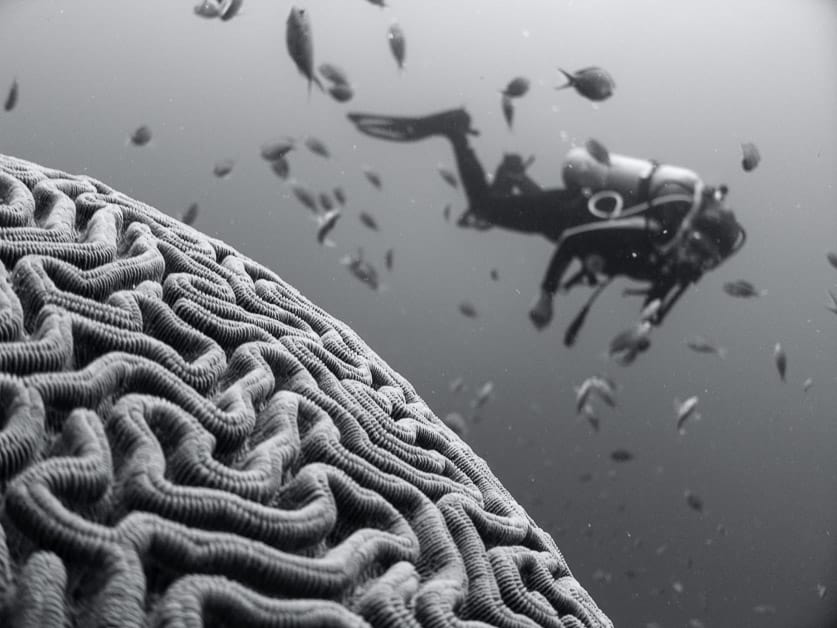
SOURCES
Nitrogen Narcosis Scuba Diving
- News on Nitrogen Narcosis by Klaus M. Stiefel, padi.com
- Nitrogen Narcosis, sciencedirect.com
- 10 Ways To Outsmart Narcosis, scubadiving.com
- Performance Impairment as a Function of Nitrogen Narcosis, psycnet.apa.org
- Nitrogen Narcosis: What Divers Should Know, healthline.com
- Nitrogen Narcosis, brittanica.com
REACH OUT
As always, we create our content with you, fellow adventurers, in mind. So, how’d we do? Did you find this informative? Did it help you make a decision? Did we miss anything? We’d love to hear from you below. Thanks for reading and we hope your next adventure is a great one!


